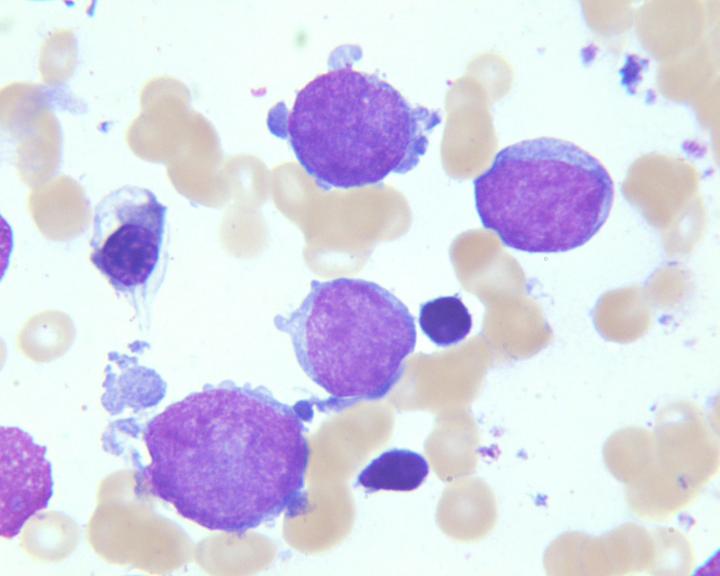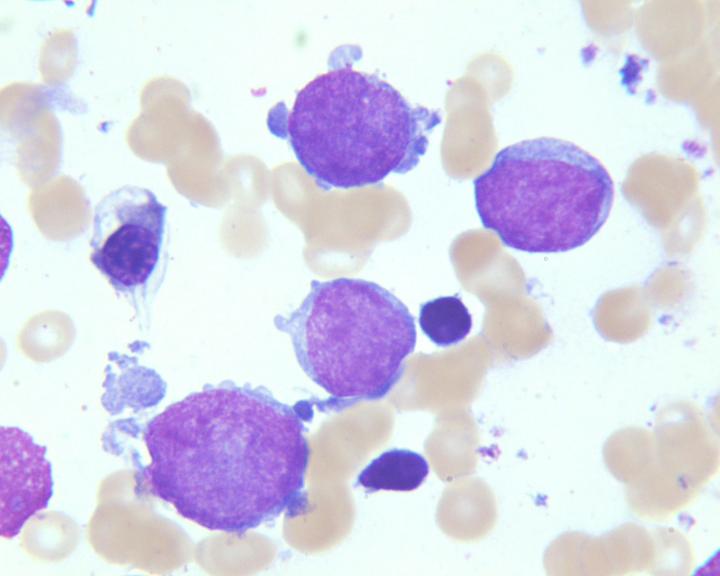
Credit: St. Jude Children's Research Hospital / Tina Motroni
Research led by St. Jude Children's Research Hospital has identified three genetic alterations to help identify high-risk pediatric patients with acute megakaryoblastic leukemia (AMKL) who may benefit from allogeneic stem cell transplants.
The study, which appears today in the scientific journal Nature Genetics, is the largest yet using next-generation sequencing technology to define the genetic missteps that drive AMKL in children without Down syndrome. AMKL is a cancer of megakaryocytes, which are blood cells that produce the platelets that help blood clot. The genetic basis of AMKL in children with Down syndrome was previously identified, but the cause was unknown in 30 to 40 percent of other pediatric cases.
"Because long-term survival for pediatric AMKL patients without Down syndrome is poor, just 14 to 34 percent, the standard recommendation by many pediatric oncologists has been to treat all patients with allogeneic stem cell transplantation during their first remission," said senior and co-corresponding author Tanja Gruber, M.D., Ph.D., an associate member of the St. Jude Department of Oncology. Allogeneic transplants use blood-producing stem cells from a genetically matched donor.
"In this study, we identified several genetic alterations that are important predictors of treatment success," she said. "All newly identified pediatric AMKL patients without Down syndrome should be screened for these prognostic indicators at diagnosis. The results will help identify which patients need allogeneic stem cell transplants during their first remission and which do not."
The alterations include the fusion genes CBFA2T3-GLIS2, KMT2A and NUP98-KDM5A, which are all associated with reduced survival compared to other pediatric AMKL subtypes. Fusion genes are created when genes break and reassemble. Such genes can lead to abnormal proteins that drive the unchecked cell division and other hallmarks of cancer.
Researchers also recommended testing AMKL patients for mutations in the GATA1 gene. GATA1 mutations are a hallmark of AMKL in children with Down syndrome, who almost always survive the leukemia. In this study, AMKL patients with GATA1 mutations and no fusion gene had the same excellent outcome. "The results raise the possibility that pediatric AMKL patients without Down syndrome who have mutations in GATA1 may benefit from the same reduced chemotherapy used to treat the leukemia in patients with Down syndrome," Gruber said.
The revised AMKL diagnostic screening and treatment recommendations are being implemented at St. Jude.
AMKL is rare in adults, but accounts for about 10 percent of pediatric acute myeloid leukemia (AML). This study involved next-generation sequencing of the whole exome or RNA of 89 pediatric AMKL patients without Down syndrome. The patients were treated at collaborating institutions in the U.S., Europe and Asia.
Along with the sequencing data, researchers analyzed patients' gene expression and long-term survival. The results showed that non-Down syndrome pediatric AMKL can be divided into seven subgroups based on the underlying genetic alteration, pattern of gene expression and treatment outcome.
The AMKL subgroups include the newly identified HOX subgroup. About 15 percent of the 89 patients in this study were in the HOX subgroup, which is characterized by several different HOX fusion genes. Normally HOX genes help regulate development, but HOX alterations have been reported in other types of leukemia.
Investigators also identified cooperating mutations that help to fuel AMKL in different subgroups. The cooperating mutations include changes in the RB1 gene and recurring mutations in the RAS and JAK pathways in cells. The alterations have been reported in other cancers.
###
The study's co-first authors are Jasmijn D.E. de Rooij of Erasmus MC-Sophia Children's Hospital, Rotterdam, Netherlands; and Cristyn Branstetter of St. Jude. The corresponding authors are Franco Locatelli, of the University of Pavia, Rome; Dirk Reinhardt, of the University of Duisburg-Essen, Essen, Germany; and Marry van den Heuvel-Eibrink, C. Michel Zwaan and Maarten Fornerod, all of Erasmus MC-Sophia Children's Hospital. The other authors are Jing Ma, Yongjin Li, Michael Walsh, Jinjun Cheng, Jinjun Dang, John Easton, Heather Mulder, Cary Koss, Pankaj Gupta, Michael Edmonson, Michael Rusch, Guangchun Song, Jinghui Zhang and James R. Downing, all of St. Jude; Askar Obulkasim and Lonneke Verboon, both of Erasmus MC-Sophia Children's Hospital; Martin Zimmermann, of Medical School of Hannover, Germany; Joshua Yew Suang Lim and Allen Eng Juh Yeoh, both of National University of Singapore; Katarina Reinhardt, of University of Duisburg-Essen; Martina Pigazzi, of the University of Padova, Padova, Italy; Lee-Yung Shih, of Chang Gung University, Taiwan; Der-Cherng Liang, of Mackay Memorial Hospital, Taipei, Taiwan; and Stephanie Halene and Diane Krause, both of Yale University, New Haven, Conn.
The research was funded in part by organizations in the Netherlands and Italy; and the Eric Trump Foundation, the St. Jude Children's Research Hospital-Washington University Pediatric Cancer Genome Project and ALSAC.
Media Contact
Jann Ingmire
[email protected]
901-595-6384
@StJudeResearch
http://www.stjude.org
############
Story Source: Materials provided by Scienmag





